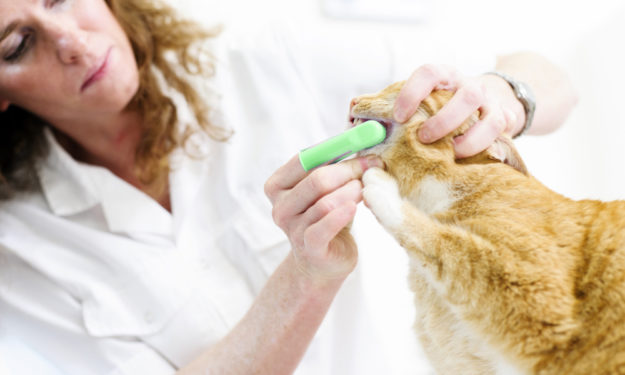Benefits of Teeth Cleaning for Cats & Dogs

Did you know that just like humans, our pets should have a dental procedure performed periodically? Dogs and cats should have their teeth cleaned every 6-12 months starting at 2-3 years of age.
80% of Pets Will Be Affected By Periodontal Disease By Age 3
Obviously, genetics and breed variation play a role in how often teeth cleaning will be recommended, but this is a general guideline. Smaller breeds will need their teeth cleaned more frequently. Overcrowding of teeth in their mouths makes them more prone to periodontal disease.
Health Issues Caused By Dental Disease
Pets with untreated periodontal disease can have a higher risk of having heart, liver, or kidney issues. If left untreated, it can cause chronic pain, inflammation, and infection of the bone surrounding the teeth. Permanent bone loss and even jaw fractures are possible in some cases. Our fur babies have a much better quality of life when they have a healthy mouth!
The Importance of Dental Radiographs
Dental radiographs are an important part of a complete dental procedure. Around 60% of a pet’s tooth is below the gum line. Dental radiographs help address many things that cannot be seen from the surface, such as:
- Tooth fractures
- Retained roots
- Impacted teeth
- Areas of bone loss
- Resorptive lesions
- Tumors
- Tooth root abscesses
Why Anesthesia-Free Dentals Are Not Recommended
Oftentimes, owners are concerned about having their pet go under anesthesia and request anesthesia-free dental cleanings instead. However, the cons of anesthesia-free cleanings far outweigh the pros with the following:
- The pet is often extremely stressed being restrained when awake.
- Pain cannot be controlled appropriately when they are awake.
- Most periodontal disease lies beneath the surface, so anesthesia-free cleanings do not address this. Only supragingival calculus can be removed, and the subgingival disease cannot be appropriately addressed through radiographs and cleaning unless they are under anesthesia.
- Anesthesia-free cleanings leave the tooth surface roughened since they do not include a full polishing to smooth this surface, so plaque will actually build up faster in the future.
- These procedures are purely cosmetic and do not actually address the root of the issue. Often, painful conditions will go undiagnosed and untreated.
Our Anesthesiologists
Luckily for our clients, we have board certified anesthesiologists who will work as a team with the primary care doctor and primary care technicians to formulate the most appropriate anesthesia plan for their pet. We have a high-quality monitoring protocol and a caring team who are fully dedicated to making the anesthetic process as smooth as possible.
Several Ethos hospitals offer veterinary dentistry. Learn more about this specialty by clicking the links below!
Bulger Veterinary Hospital Dentistry
VSH – Sorrento Valley Dentistry
Written by Laura Williams, DVM